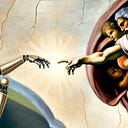In our previous post, What is Blockchain?, we covered the blockchain-basics — taking a look at what the technology is and does, why it’s a big deal and the different classifications of blockchain technology.
In this post, we’ll be diving deeper into how it works and the kind of impact we can expect from the tech everybody’s heard about, but few really understand.
The Mechanics of Blockchain
Blockchain overrides the need for a central authority by distributing information previously held in a centralized ledger across a network of computers.
In this way, no one person or organization owns the blockchain, yet anyone with an internet connection (and access, in the case of private blockchains) can make use of it and help maintain and verify it.
When a transaction (which is essentially the transfer of ownership of something) is made on a blockchain, it is added to a group of transactions, known as a ‘block’. Each block of transactions is connected to the block before and after it in a chronological, irreversible chain, hence the term ‘blockchain’. Each block is stamped with a unique cryptographic code, ensuring records cannot be counterfeited or changed.
For each block of transactions to be confirmed or verified, individuals must compete to solve a complex mathematical problem. The first to solve the problem gets a payout, thus providing an incentive to keep verifying blocks of transactions. The process of solving the math problem for a payout is known as mining. Since the blockchain is decentralized and distributed among all those using it, any attempt to tamper with data won’t be approved by the rest of the network and will be ignored.
Thus, a blockchain is a list of records which are securely linked together in a shared, trusted, ledger that anyone can inspect, but which no single entity controls. The participants in any blockchain system have to work together to keep the ledger updated and it can only be amended according to network consensus.
Assessing the Impact of Blockchain Technology
Blockchain will affect everyone using smart devices and computers. Many industries have already begun adopting the technology and the enthusiasm for further developing it to better understand its most impactful applications is fervent.
Some of the more notable changes that blockchain is set to bring about include the solving of problems of data manipulation, transparency and security online.
Creating an ecosystem where there is no third-party interference by eliminating the middleman, a notion which was central to the conception of the first blockchain, is still a core driver of developments in the blockchain space. If this is successfully achieved in the months and years to come, we can expect greatly reduced transaction fees and much faster transaction times when conducting transfers of value in the digital world.
With increased uptake of this technology we are also likely to witness increased transparency and accessibility of data management, greater user empowerment and enhanced security.
Ultimately we can expect processes in life and work to be conducted with guaranteed integrity, ecosystems and societies to be drastically simplified and a world in which trust, for the large part, is no longer a human interaction, but an in-built protocol — the trust protocol.
Developments in the Blockchain Domain
Blockchain creates opportunities for organisations to become more transparent, decentralized, secure, and efficient.
Many of the current developments in the blockchain domain are focused on creating decentralized applications (DApps), implementing Smart Contract technology, making peer-to-peer transactions of all sizes cheaper or free, improving identity verification and verifiability, revolutionizing asset ownership and management, the equity trade, copyright and voting systems, to name but a few.
It’s been a rollercoaster ride so far and you can’t imagine it to be any different once real-world blockchain applications reach mass adoption.
